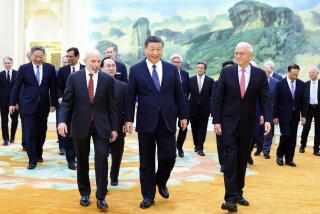Business Coalition to Lobby for Closer Economic Ties to China
- Share via
WASHINGTON — The U.S. business community, worried that the burgeoning controversy over alleged Chinese influence-buying in Washington is imperiling trade relations with Beijing, is launching a major lobbying campaign to expand economic ties to China.
The Business Coalition for U.S.-China Trade, which includes about 1,000 multinational corporations and trade associations, plans to visit every member of the House and Senate, according to Calman Cohen, the group’s co-chairman. The group will carry the message that expanding U.S. links to the booming Chinese economy will promote America’s foreign policy interests and help create jobs for U.S. workers.
Trade experts say the group’s lobbying campaign will play a significant role in this year’s debate over Sino-American trade.
“On China over the past few years, [the Business Coalition] has probably been the most effective collective voice,” said Greg Mastel, a former Senate aide who is now a trade specialist at the Economy Strategy Institute.
The coalition intends to make a more comprehensive pitch this year than in the past, Cohen said.
In previous years, the group has focused primarily on securing annual renewals from Congress of China’s “most-favored-nation” status, which allows Chinese products to be sold in the United States on the same terms as other countries’ products. Human-rights advocates have fought to deprive Beijing of this status.
This year’s campaign will be aimed at attaining “a stable U.S.-China commercial framework built on three pillars,” according to the group’s position paper, which it furnished to the Washington Post.
Those pillars include bringing China into the World Trade Organization under terms that require Beijing to expand foreign access to its markets; bestowing permanent MFN status on China; and terminating unilateral U.S. sanctions that restrict the export of certain high-technology products to China.
This comes at a time of growing criticism of the Clinton administration’s policy of “engaging” China.
In recent weeks, newspaper reports have alleged China has attempted to gain political influence through improper political donations. In addition, there are long-standing complaints on Capitol Hill about matters ranging from human rights to Taiwan.
More to Read
Inside the business of entertainment
The Wide Shot brings you news, analysis and insights on everything from streaming wars to production — and what it all means for the future.
You may occasionally receive promotional content from the Los Angeles Times.










